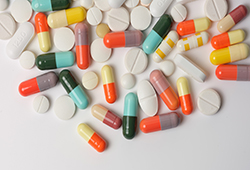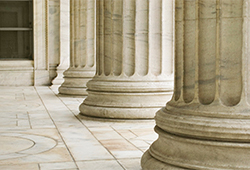 President Trump recently announced four Executive Orders that direct the Secretary of the Department of Health and Human Services (HHS) to implement policy changes to reduce out-of-pocket costs and the price of prescription drugs. All but one of the Executive Orders has been issued with the remaining order on hold until August 24, 2020 pending discussions between the White House and leaders of the pharmaceutical industry. The Executive Orders include some prior policy proposals aimed at lower the cost of drugs and generating savings across the health care system. If implemented, many of these proposals will likely be challenged in court.
President Trump recently announced four Executive Orders that direct the Secretary of the Department of Health and Human Services (HHS) to implement policy changes to reduce out-of-pocket costs and the price of prescription drugs. All but one of the Executive Orders has been issued with the remaining order on hold until August 24, 2020 pending discussions between the White House and leaders of the pharmaceutical industry. The Executive Orders include some prior policy proposals aimed at lower the cost of drugs and generating savings across the health care system. If implemented, many of these proposals will likely be challenged in court.
Most Favored Nations Policy
If issued, this Executive Order could tie the price that Medicare pays for certain drugs administered by doctors to prices negotiated by other economically comparable countries. This proposed Order is similar to a 2018 prior proposal by the Center for Medicare and Medicaid Services (“CMS”) to use its demonstration authority to test reimbursement changes for certain separately payable Part B drugs and biologicals using an international pricing index (“IPI”). The IPI model would result in lowering Medicare reimbursement for select drugs in certain geographies covered by the model to better match prices paid by similar economically situated countries. Health officials estimate this change would save Medicare $17 billion in the first five years. This order will be held until August 24, 2020 pending discussions with pharmaceutical industry leaders about alternative measures for lowering costs.
Increase Drug Importation
This Executive Order is designed to minimize international disparities in drug prices by increasing the trade of prescription drugs between nations with lower prices and those with persistently higher ones. The Administration argues that “reducing trade barriers and increasing the exchange of drugs will likely result in lower prices for the country that is paying more for drugs.” The Administration aims to expand safe access to lower-cost importuned prescription drugs via three primary strategies.
First, the Order requests the Secretary of HHS to consider “facilitating grants to individuals of waivers of the prohibition of importation of prescription drugs” provided that it “poses no additional risk to public safety and results in lower costs to the American People” under the Federal Food, Drug, and Cosmetic Act (FDCA).
Second, it addresses “authorizing the reimportation of insulin products” where the Secretary of HHS finds that it is “required for emergency medical care” under section 801(d) of the FDCA. Section 801(d) generally places limitations on the reimportation of U.S. manufactured insulin products unless an exception is met.
Third, it requires the Secretary of HHS to complete the rulemaking process regarding a December 23, 2019 proposed rule to import prescription drugs from Canada. The proposed rule contemplates allowing states and certain other non-federal government entities to import certain prescription drugs from Canada if the certain requirements under the FDCA are met.
Access to Affordable Life-saving Medications
This Executive Order is designed to help low income American’s without access to affordable insulin and injectable epinephrine through commercial insurance or Federal health care programs, such as Medicare and Medicaid, to purchase these products from a Federally Qualified Health Centers (“FQHC”) at a price that aligns with the cost at which the FQHC acquired the medication. FQHCs are community-based health care providers that provide primary care services in underserved areas. FQHCs receive discounted prices through the 340B Prescription Drug Program on prescription drugs.
The Order directs the Secretary of HHS to condition future grants available to FQHCs on establishing practices to make insulin and injectable epinephrine available at the 340B discounted price paid by the FQHCs, plus a minimal administration fee, to individuals with low incomes. The Order specifies that low income individuals include those who (a) have a high cost-sharing requirement for either insulin or injectable epinephrine, (b) have a high unmet deductible, or (c) have no healthcare insurance.
Lowering Prices for Patients by Eliminating Kickbacks to Middlemen
This Executive Order directs the Secretary of HHS to finalize a February 2019 proposed rule that would revise the discount safe harbor to the federal Anti-Kickback Statute (“AKS”) with respect to pharmaceutical manufacturer rebates to health plans and pharmacy benefit managers (“PBMs”). Prior to finalizing the rule, the Order requires the Secretary of HHS to publicly confirm that the rule “is not projected to increase Federal spending, Medicare beneficiary premiums, or patients’ total out-of-pocket costs.” Specifically, the Order directs the Secretary of HHS to “complete the rulemaking process he commenced seeking to:
(a) exclude from safe harbor protections under the anti-kickback statute, section 1128B(b) of the Social Security Act, 42 U.S.C. 1320a-7b, certain retrospective reductions in price that are not applied at the point-of-sale or other remuneration that drug manufacturers provide to health plan sponsors, pharmacies, or PBMs operating the Medicare Part D program; and
(b) establish new safe harbors that would permit health plan sponsors, pharmacies, and PBMs to apply discounts at the patient’s point-of-sale in order to lower the patient’s out-of-pocket costs, and that would permit the use of certain bona fide PBM service fees.”
The Order makes it clear the Administration view rebates as the “functional equivalent of kickbacks” that “erode savings that could otherwise go to the Medicare patients taking those drugs. Yet currently, Federal regulations create a safe harbor for such discounts and preclude treating them as kickbacks under the law.” The policy objective of the order is to ensure that discounts offered on prescription drugs are passed on to patients. The Order states that, narrowing the safe harbor for discounts under the AKS will allow for billions in dollars of rebates in the Medicare Part D program to go patients at the point of sale.
The Administration’s policy positions and proposals in the Order and the prior proposed rule have elicited strong reactions from various stakeholders who suggested they may challenge any changes implemented as a result of this Order.
 On December 27, 2020, the President signed into law the “Consolidated Appropriations Act, 2021” (the “Act”). Included within this omnibus legislation are several provisions (in Division BB, Title III, Subtitle C) that affect the regulation of generic drugs and biosimilar medicines by the U.S. Food and Drug Administration (FDA).
On December 27, 2020, the President signed into law the “Consolidated Appropriations Act, 2021” (the “Act”). Included within this omnibus legislation are several provisions (in Division BB, Title III, Subtitle C) that affect the regulation of generic drugs and biosimilar medicines by the U.S. Food and Drug Administration (FDA). President Trump recently announced four Executive Orders that direct the Secretary of the Department of Health and Human Services (HHS) to implement policy changes to reduce out-of-pocket costs and the price of prescription drugs. All but one of the Executive Orders has been issued with the remaining order on hold until August 24, 2020 pending discussions between the White House and leaders of the pharmaceutical industry. The Executive Orders include some prior policy proposals aimed at lower the cost of drugs and generating savings across the health care system. If implemented, many of these proposals will likely be challenged in court.
President Trump recently announced four Executive Orders that direct the Secretary of the Department of Health and Human Services (HHS) to implement policy changes to reduce out-of-pocket costs and the price of prescription drugs. All but one of the Executive Orders has been issued with the remaining order on hold until August 24, 2020 pending discussions between the White House and leaders of the pharmaceutical industry. The Executive Orders include some prior policy proposals aimed at lower the cost of drugs and generating savings across the health care system. If implemented, many of these proposals will likely be challenged in court.

 As part of the U.S. government’s response to the COVID-19 pandemic, on March 10, 2020, the Secretary of Health and Human Services (“Secretary”) issued a Declaration pursuant to the Public Readiness and Emergency Preparedness Act (“PREP Act”), 42 U.S.C. § 247d-6d. This Declaration activated immunity from personal injury, property damage, and other types of claims for companies and certain professionals who manufacture, distribute, or use “covered countermeasures”— certain drugs and devices, or components thereof, that may be used to treat COVID-19 patients or combat the COVID-19 pandemic.[1] The PREP Act provides broad immunity from liability, but applies only to products and persons that qualify for the immunity under the PREP Act and the limits established in the Secretary’s Declaration.
As part of the U.S. government’s response to the COVID-19 pandemic, on March 10, 2020, the Secretary of Health and Human Services (“Secretary”) issued a Declaration pursuant to the Public Readiness and Emergency Preparedness Act (“PREP Act”), 42 U.S.C. § 247d-6d. This Declaration activated immunity from personal injury, property damage, and other types of claims for companies and certain professionals who manufacture, distribute, or use “covered countermeasures”— certain drugs and devices, or components thereof, that may be used to treat COVID-19 patients or combat the COVID-19 pandemic.[1] The PREP Act provides broad immunity from liability, but applies only to products and persons that qualify for the immunity under the PREP Act and the limits established in the Secretary’s Declaration. As discussed in Goodwin’s prior Client Alert, on April 10, 2020, the U.S. Department of Health and Human Services (HHS) began disbursing $30 billion to Medicare providers and suppliers under the Public Health and Social Services Emergency Fund (PHSS Emergency Fund). HHS is requiring providers to agree to certain terms and conditions or return the payments. A number of the terms and conditions created some confusion as to whether providers who have not provided services directly related to COVID-19 may keep the payments. HHS has now clarified that providers may keep payments distributed under the PHSS Emergency Fund regardless of whether they have or will provide services directly related to COVID-19.
As discussed in Goodwin’s prior Client Alert, on April 10, 2020, the U.S. Department of Health and Human Services (HHS) began disbursing $30 billion to Medicare providers and suppliers under the Public Health and Social Services Emergency Fund (PHSS Emergency Fund). HHS is requiring providers to agree to certain terms and conditions or return the payments. A number of the terms and conditions created some confusion as to whether providers who have not provided services directly related to COVID-19 may keep the payments. HHS has now clarified that providers may keep payments distributed under the PHSS Emergency Fund regardless of whether they have or will provide services directly related to COVID-19. Subtitle F of the recently enacted U.S. CARES Act substantially reforms the regulatory framework for non-prescription drugs, representing the most significant update of the review process for over-the-counter (OTC) drugs since that process was first established in 1972. The Act draws from recent legislative proposals to reform OTC regulation, incorporating a modified version of the “Over-the-Counter Monograph Safety, Innovation, and Reform Act of 2019” (S. 2740, H.R. 3443) that was passed 91-2 by the U.S. Senate in December 2019. At that time, Senate Health Committee Chairman Lamar Alexander (R-Tenn.) described the legislation as “the most important new law affecting the safety, innovation, and affordability of over-the-counter drugs since the 1970s.”
Subtitle F of the recently enacted U.S. CARES Act substantially reforms the regulatory framework for non-prescription drugs, representing the most significant update of the review process for over-the-counter (OTC) drugs since that process was first established in 1972. The Act draws from recent legislative proposals to reform OTC regulation, incorporating a modified version of the “Over-the-Counter Monograph Safety, Innovation, and Reform Act of 2019” (S. 2740, H.R. 3443) that was passed 91-2 by the U.S. Senate in December 2019. At that time, Senate Health Committee Chairman Lamar Alexander (R-Tenn.) described the legislation as “the most important new law affecting the safety, innovation, and affordability of over-the-counter drugs since the 1970s.”